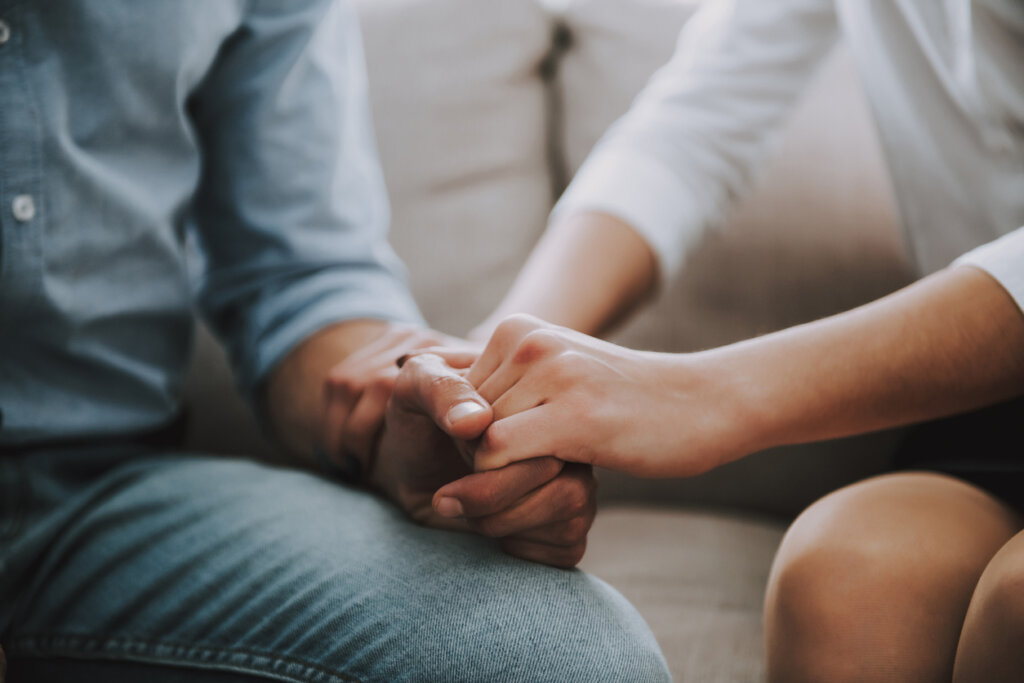You and Your Partner Are Suffering From Depression. What Can You Do?


Written and verified by the psychologist Valeria Sabater
Have you asked your partner how they feel today? It’s all too easy to overlook these basic issues. However, they’re the kinds that promote mutual care and daily support in a relationship. In fact, if there’s one thing you shouldn’t ignore, it’s the psychological well-being of both you and your partner.
According to a report from the American Psychiatric Association (APA), one in six people will experience depression at some point in their life. This means that it may be the case that, in a relationship, both partners are diagnosed with a mood disorder. These are complex situations that present notable challenges.
It’s difficult to give the best of yourself to your loved one when you’re also struggling with despair. It’s stressful to care for and support them when you also feel physically and emotionally drained. Not to mention how to take care of your children, if you have them. All this can further aggravate your feelings of anguish, as well as the mental burden itself.
If you’re both suffering from depression, you need specialized support. You might think, with the two of you suffering, the situation will be far worse. However, there are specific strategies that can help. Indeed, there are many effective treatments and strategies to overcome depression. Therefore, you can overcome it, even if you’re both suffering from it.
The most important thing in all cases is to get a diagnosis. But many couples go through moments of discouragement and despair, but don’t take the step to receive specialized help.

What to do if you and your partner are suffering from depression
There are multiple variables behind double depression in a relationship. It could be due to long-term unemployment, the loss of a child, unresolved trauma, or other factors that aren’t easy to define. Often, there may be a common cause that triggers it, making both members gravitate toward the same emotional resonance.
At other times, this condition arises independently in each partner but eventually comes together in the same shared scenario. Bitterness and despair can be fed back by dynamics that reinforce the discomfort. One example of this is when one partner needs the other’s understanding and support but they don’t get it because the other partner doesn’t have the strength to provide it.
A study conducted by the State University of Florida (USA) highlights that this reality is more frequent in older couples. Frequently, isolation, added to the illness, can cause both spouses to develop a depressive disorder. This can dramatically affect their quality of life.
If you and your partner are suffering from depression, the most important thing is to get a diagnosis and not let the situation progress on its own. Otherwise, it’ll intensify and build walls and distance between you. External support and having a therapeutic strategy are decisive. There are also a number of helpful tips that’ll be useful.
You shouldn’t accept the care of your partner or yourself alone. You need a support network to help.
1. We all battle depression differently
Maybe your partner can carry on as normal, including going to work, while you’ve had to take time off. However, dealing with depression in a different way doesn’t mean that either one of you is suffering with less or greater intensity.
We all experience and deal with depression in different ways. Therefore, it’s equally likely that each of you will require a different psychotherapeutic approach.
2. You don’t need to take responsibility for your partner’s suffering
If you and your partner are suffering from depression, the last thing you need to do is take responsibility for healing theirs, thus putting the burden on your shoulders. Indeed, if you approach it in this way, you’ll both fail. Each of you should be responsible for your own process of healing. At the same time, you must support each other. That said, you must ensure you don’t neglect yourself by trying to pull your partner out of the abyss.
You’re on a shared journey. You can both be allies and each other’s refuges. However, don’t put all your energies into your loved one to the extent that you eventually run out of strength.
3. Develop your own resources
Each of you should have your own psychologist, doctor, psychiatrist, etc. You should also each have your own personal resources. By this, we mean that both of you should have, within your reach, whatever works best for you in your own healing process. These might be friends, family, or hobbies to promote behavioral activation, etc.
If you’re both suffering from depression, you must take care of yourselves so that you’re in a healthy position to help each other.
4. Schedules and routines
You need to have some habits and routines that allow you to regain control of your life. It’s crucial that you carry out activities that favor your social connections and awaken your interest in doing things again.
In this regard, the fact that both of you are suffering from depression can be an advantage. For example, if you don’t feel like going out for a walk or playing sports, your partner can motivate you (and vice versa). Good nutrition and being in contact with your friends and family is also essential.

5. Adopt self-awareness to understand your depression
Depression is built on the foundation of thoughts, emotions, and behaviors that reinforce it. Each of you has your own personal conditions that you need to know about. Therefore, you must develop adequate self-awareness concerning the internal dynamics that are aggravating your suffering.
This is something you do alone. That said, you can also help each other. For instance, if you notice your partner doesn’t want to get out of bed, you can suggest an activity.
You must keep in mind that depressive episodes come in waves. Consequently, there’ll be times when you feel better and your partner is immobilized. This can be an advantage for both of you because you’ll become each other’s best reinforcement.
6. Mutual self-care rules
It’s a good idea to agree on some mutual self-care guidelines. Not only will this help you make better progress in the treatment of your disorder, but you’ll also strengthen your relationship. Here’s what you need to do:
- Take care of communication between you. Be open with each other about all your feelings, thoughts, and needs in a sincere way. Don’t wait for each other to guess what’s wrong.
- Ask each other how you are. Be respectful and empathic with your words, actions, and intentions in a reciprocal way.
- Develop a system of how you each want to be cared for. There’ll be times when you need solitude, and others when it’ll be helpful for you to talk to a friend and not to your partner. You must discuss this between the two of you and make sure you respect each others’ wishes.
Finally, remember that these kinds of situations are in no way exceptional. Depression, like any other mental problem, can make an appearance in anyone’s life at any time. Therefore, it sometimes happens that both partners suffer from a psychological condition at the same time. Always make sure you ask for help and never approach suffering alone.
All cited sources were thoroughly reviewed by our team to ensure their quality, reliability, currency, and validity. The bibliography of this article was considered reliable and of academic or scientific accuracy.
- Girard JM, Cohn JF, Mahoor MH, Mavadati SM, Hammal Z, Rosenwald DP. Nonverbal social withdrawal in depression: evidence from manual and automatic analysis. Image Vis Comput. 2014;32(10):641-647. doi:10.1016/j.imavis.2013.12.007
- Pradeep N, Sutin AR. Spouses and depressive symptoms in older adulthood
- King-Casas B, Chiu PH. Understanding interpersonal function in psychiatric illness through multiplayer economic games. Biol Psychiatry. 2012;72(2):119-125.. Sci Rep. 2015;5:8594. doi:10.1038/srep08594
This text is provided for informational purposes only and does not replace consultation with a professional. If in doubt, consult your specialist.








